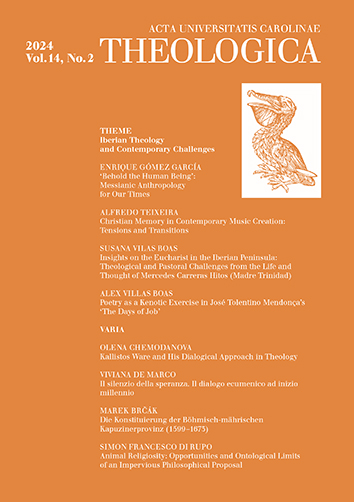AUC Theologica je recenzovaný odborný teologický časopis, který vychází dvakrát ročně. S výjimkou slavistických témat, recenzí a zpráv zveřejňuje příspěvky pouze ve světových jazycích – v angličtině, němčině, francouzštině a italštině.
Časopis se zaměřuje na širokou škálu teologických disciplín, jako je například systematická teologie, biblistika, patristika, pastorální a spirituální teologie, katechetika nebo církevní historie. V rámci nich se snaží reflektovat současná témata, která často vyžadují interdisciplinární přístup. Vítáme také teologické články, které se dotýkají jiných akademických oborů, jako je například filosofie, sociologie, literární věda či vědy přírodní.
Každé číslo se skládá ze dvou sekcí. Tematická sekce obsahuje články s jednotným zaměřením. V sekci s názvem „Varia“ publikujeme původní studie na různá aktuální teologická témata. Všechna čísla časopisu jsou dostupná v režimu Open Access.
AUC THEOLOGICA, Vol 14 No 1 (2024), 57–79
Der Begriff der Angst und die Theologie
[The Concept of Fear and Theology]
Jakub Sirovátka, Reinhold Esterbauer, René W. Dausner
DOI: https://doi.org/10.14712/23363398.2024.6
zveřejněno: 01. 11. 2024
Abstract
Fears have increased in recent years, both individually and collectively. Such fears about one’s own existence can be interpreted in different ways: psychologically, sociologically or politically, but also philosophically or theologically. The article deals with the phenomenon of fear/anxiety from three perspectives on the border of philosophy and theology. In 20th century philosophy, Martin Heidegger defined anxiety as the basic human mood in which man is brought before the nothingness of his existence and thus before himself. This situation of anxiety gives rise to the question of one’s own authentic existence. Heidegger’s theory has become an essential theory of anxiety, not only within phenomenology, and has significantly influenced further discussion. Emmanuel Levinas reacted to Heidegger with frontal criticism. He placed anxiety in an ethical context and thus gave the term a new meaning. The article presents and contrasts both approaches by Heidegger and Levinas. This is followed by questions for theological thinking that arise from the two thinkers’ conceptions of anxiety. These are then discussed and explained theologically against the background of Rahner’s way of thinking and taken further. It can be seen that fear is not only a negative phenomenon that needs to be overcome, but that it can also be interpreted in a positive way. Anxiety is that which throws people back on themselves and thus poses the question of the meaning of their own lives with existential urgency. The need for meaning could therefore be seen as the source of the search for a personal God.
klíčová slova: Theology; Phenomenology; Fear; Anxiety; Martin Heidegger; Emmanuel Levinas; Karl Rahner

Der Begriff der Angst und die Theologie is licensed under a Creative Commons Attribution 4.0 International License.
148 x 210 mm
vychází: 2 x ročně
cena tištěného čísla: 100 Kč
ISSN: 1804-5588
E-ISSN: 2336-3398
